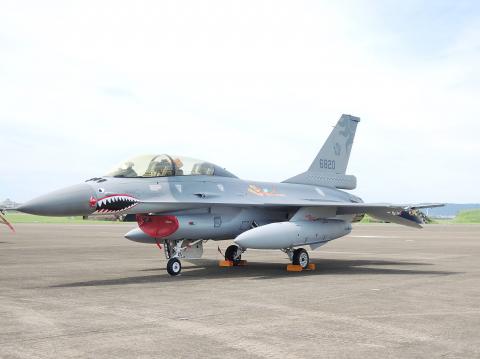The upgrade of Taiwan’s fleet of Lockheed Martin F-16A/B fighter jets with new electronic countermeasures (ECM) pods has begun on a small scale, the air force said yesterday.
The upgrade is to improve the planes’ air-to-air and air-to-ground surveillance capabilities and combat capability to meet the needs of advanced warfare.
The fleet has 80 AN/ALQ-184(V) ECM pods and the air force has earmarked US$160 million to purchase 42 new ALQ-131A FMS pods that the US army has been developing to replace the old pods, but it would now only be able to buy 12 FMS pods for that budget due to increased research and development costs, the air force said.

Photo: Lo Tien-bin, Taipei Times
The air force plans to outfit the F-16 fleet with the new FMS pod, which can be integrated with the jets’ combat systems and fit with the air force’s logistical planning, it said.
Development and testing of the new pods have been completed and they are being produced in small batches, but further upgrades are possible, the air force added.
The procurement was in accordance with the Government Procurement Act (政府採購法), military procurement regulations and the US Department of Defense’s Security Assistance Management Manual, the air force said, denying local media reports that it plans to amortize the procurement expense over several fiscal years.
It said the upgrade is in accordance with a January 2012 legislative resolution stipulating that the air force “should procure the same equipment used by the US Air Force to ensure consistency in weapons deployment and maintenance with the US Air Force and to ensure government spending efficiency.”
In other news, the Web site of the National Security Bureau (NSB) has been hit by a rising number of cyberattacks since President Tsai Ing-wen (蔡英文) assumed office in May last year, according to a report.
The Web site experienced 17,659 cyberattacks over the first half of last year, the NSB said in a report included as part of its budget proposal for next year, which it has submitted to the Legislative Yuan for approval.
The figures for January to June last year almost exceeded the 19,826 attacks it withstood in the whole of 2015, the report said.
Hacking attempts have also risen sharply since Tsai assumed office on May 20 last year, it added.
The number of hacking attempts rose to 613,789 between July and December last year, or an average of 102,298 attempts per month, the report said, adding that this represented a sharp increase from previous years.
However, it said hacking attempts have gradually declined this year, dropping to 108,069 from January to June.
All attempts have been detected and successfully blocked, the bureau said in its budget proposal.
Although the bureau did not specify the origins of the attacks, they are suspected to mostly come from China, as the NSB is a major target for Chinese military and civilian hackers.
The bureau said it has continued to shore up its cyberdefense capabilities in the face of the attacks.
More personnel and resources have also been allocated to increase the agency’s digital counter-attack capabilities and to regularly update its computer security system, the bureau said.

Chinese Nationalist Party (KMT) Chairman Eric Chu (朱立倫), spokeswoman Yang Chih-yu (楊智伃) and Legislator Hsieh Lung-chieh (謝龍介) would be summoned by police for questioning for leading an illegal assembly on Thursday evening last week, Minister of the Interior Liu Shyh-fang (劉世芳) said today. The three KMT officials led an assembly outside the Taipei City Prosecutors’ Office, a restricted area where public assembly is not allowed, protesting the questioning of several KMT staff and searches of KMT headquarters and offices in a recall petition forgery case. Chu, Yang and Hsieh are all suspected of contravening the Assembly and Parade Act (集會遊行法) by holding

PRAISE: Japanese visitor Takashi Kubota said the Taiwanese temple architecture images showcased in the AI Art Gallery were the most impressive displays he saw Taiwan does not have an official pavilion at the World Expo in Osaka, Japan, because of its diplomatic predicament, but the government-backed Tech World pavilion is drawing interest with its unique recreations of works by Taiwanese artists. The pavilion features an artificial intelligence (AI)-based art gallery showcasing works of famous Taiwanese artists from the Japanese colonial period using innovative technologies. Among its main simulated displays are Eastern gouache paintings by Chen Chin (陳進), Lin Yu-shan (林玉山) and Kuo Hsueh-hu (郭雪湖), who were the three young Taiwanese painters selected for the East Asian Painting exhibition in 1927. Gouache is a water-based

Taiwan would welcome the return of Honduras as a diplomatic ally if its next president decides to make such a move, Minister of Foreign Affairs Lin Chia-lung (林佳龍) said yesterday. “Of course, we would welcome Honduras if they want to restore diplomatic ties with Taiwan after their elections,” Lin said at a meeting of the legislature’s Foreign Affairs and National Defense Committee, when asked to comment on statements made by two of the three Honduran presidential candidates during the presidential campaign in the Central American country. Taiwan is paying close attention to the region as a whole in the wake of a

OFF-TARGET: More than 30,000 participants were expected to take part in the Games next month, but only 6,550 foreign and 19,400 Taiwanese athletes have registered Taipei city councilors yesterday blasted the organizers of next month’s World Masters Games over sudden timetable and venue changes, which they said have caused thousands of participants to back out of the international sporting event, among other organizational issues. They also cited visa delays and political interference by China as reasons many foreign athletes are requesting refunds for the event, to be held from May 17 to 30. Jointly organized by the Taipei and New Taipei City governments, the games have been rocked by numerous controversies since preparations began in 2020. Taipei City Councilor Lin Yen-feng (林延鳳) said yesterday that new measures by